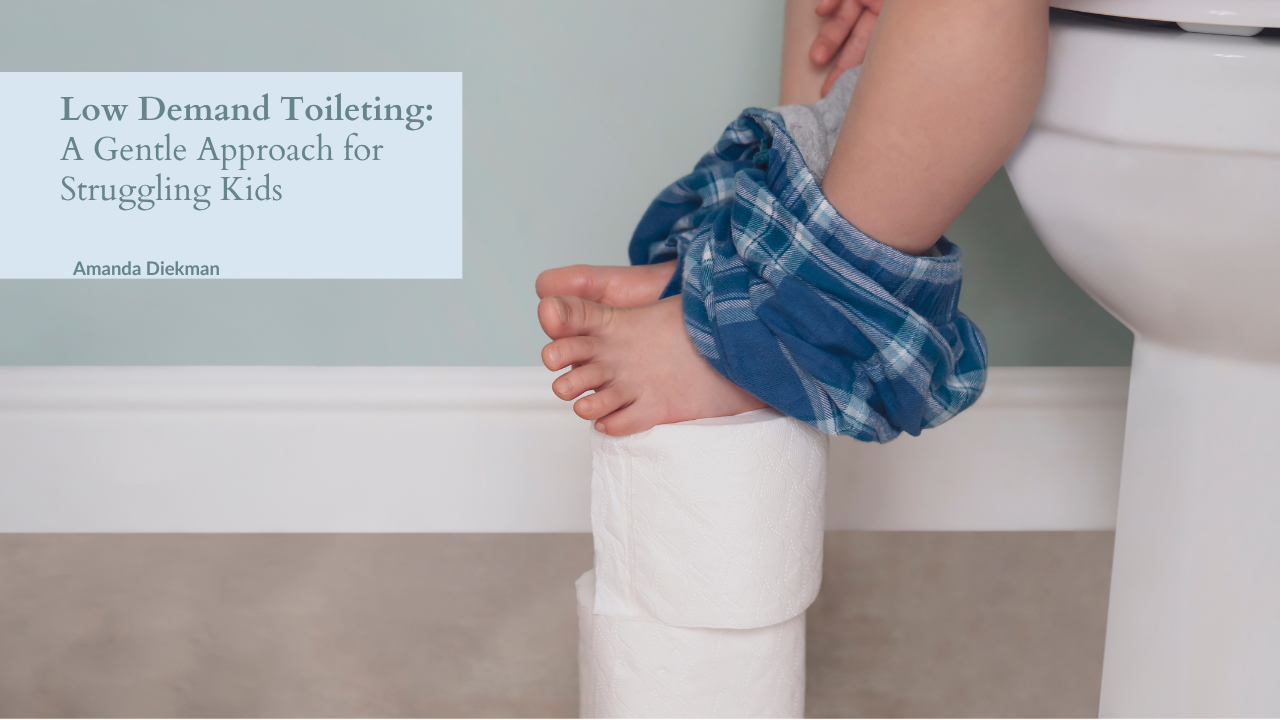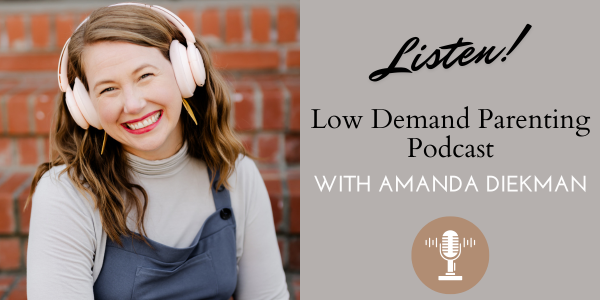Low Demand Toileting: A Gentle Approach for Struggling Kids
Jun 06, 2025
If there’s one parenting milestone that carries enormous invisible pressure, it’s toileting.
From toddlerhood onward, we’re surrounded by messages that potty training should happen early, easily, and once and for all. If it doesn’t, we feel like something is wrong — with our child, with ourselves, with our parenting. Especially when our child is autistic, PDA, or otherwise neurodivergent, the shame and fear can be overwhelming.
But here’s the truth:
Toileting isn’t a simple skill. It’s a complex, multi-layered demand that touches almost every part of a child’s regulation system. And when a nervous system is fragile, overstressed, or hypersensitive to demands, toileting can feel — and be — impossibly hard.
If you’re struggling with this, you are not alone. And you are not failing.
Let’s talk about why toileting can be so tricky, what dropping demands really looks like here, and how to trust your child’s process without shame or fear.
Why Toileting Can Feel Impossible
Toileting doesn’t just require one skill — it stacks dozens of tiny demands at once:
- Internal demands: Feeling the need to go = internal demand = possible panic.
- Sensory challenges: Smells, sights, temperatures, body sensations can feel overwhelming.
- Transitions: Stopping a preferred activity to go is a major shift.
- Motor coordination: Managing clothes, wiping, flushing, hand washing all require fine motor skills under pressure.
- Social rules: Privacy, discretion, timing, and performance are all expected — often without clear instruction.
Quick Teaching Point:
Toileting is not one demand. It’s dozens of invisible demands stacked together. For a child whose nervous system is already on high alert, it’s no wonder it feels unbearable sometimes.
Common Invisible Demands Around Toileting
(And Ways to Creatively Drop Them)
|
Common Demand |
Creative Low Demand Alternative |
|
“You need to go to the bathroom. I can tell.” |
Go to the bathroom yourself, or offer a gentle and curious check-in: “Do you notice anything in your body?” |
|
“Go now even if you don’t feel ready.” |
Respect body autonomy — offer access to a bathroom but create a comfortable culture for refusal without pressure. |
|
“No more diapers after age X.” |
Normalize pull-ups or diapers as helpful supports and accommodations, not shameful or needing to be hidden. |
|
“You must wipe properly every time.” |
Scaffold wiping skills over time without pressure or evaluation. Give options of wet wipes, wash clothes, bidets, squirt bottles, or adult-supported cleaning. |
|
“Wash your hands after every time.” |
Offer hand wipes, different types of soap, and sanitizer nearby as an accessible low-demand alternative. Stop mentioning it and see if ability to wash increases with fewer reminders. Try visual reminders instead of verbal ones. |
|
“Go alone, be independent.” |
Offer co-regulation: “I’ll sit with you. We can read a silly book together.” “Do you want to bring in your tablet or listen to a podcast?” |
Real-Life Low Demand Toileting Moments
- Older Kids and Pull-Ups:
One 10-year-old I know needed to return to pull-ups after a long period of independence because of a traumatic school experience. The family reframed the pull-up not as a regression, but as a necessary support for healing. The child’s dignity and autonomy stayed intact because the family focused on comfort over compliance. The pull-up was not a source of shame; it was a needed accommodation that brought the child safety and autonomy. - Burnout and Bedwetting:
During periods of intense burnout, it’s common for previously mastered toileting skills to fall apart. One child started wetting the bed again at 12 years old after they went into burnout. Instead of focusing on “fixing” the bedwetting, the family focused on making nighttime care easier: mattress protectors, extra pajamas by the bed, frequent sheet-washing, and a zero-shame policy. Without making a big deal about it or needing to talk about it, the family increased their supports for the struggling tween. Over time, as the child’s nervous system stabilized, the accidents decreased naturally.
What About Health and Hygiene?
Sometimes toileting struggles can create physical health risks (diarrhea, constipation, withholding, yeast infection, UTIs). It’s okay — and necessary — to seek support for your child’s physical wellbeing. However, finding solutions is often a long road, not a short one, and requires many low-demand strategies along the way.
- You may use declarative language and deep listening to communicate with your child around the need for further medical care, acknowledging that their body is communicating its needs, and the need to join together with skilled providers to listen to what their body is saying.
- You can advocate for accommodations for your child like virtual appointments, medications that are tailored to what your child can access (rather than forcing meds through battling or heavy incentivising).
- You may work with a skilled nutritionist who can look closely at your child’s safe foods and their overall diet to understand how small changes may better support their toileting. A creative and compassionate nutritionist can be an incredible resource.
- You may find a collaborative and holistic medical provider who can find lower-demand ways to understand the child’s digestion and processing without blood work (if blood work is a high demand for your child or teen, as it is for many), using urine testing, stool testing, and other non-invasive ways to better understand the functional medical reasons for their challenges, if they exist.
All day long, we’re eating and drinking, which means that toileting is a constant reality. And it also means we get a lot of tries at it. It’s so tempting to hyperfocus and panic, to count the hours since the last poop, and to wring our hands, freaking out about when, whether, and how they can make it to the toilet.
But here’s the key: compassion first, solutions second.
Final Thoughts: Trust Over Timelines
There is no single “right age” for independent toileting.
There is no gold star for fastest-trained kid.
There is no shame in needing extra time, extra support, or extra flexibility.
When you release the timeline and trust the process, you give your child the greatest gift: the freedom to build bodily autonomy from a place of safety, not fear.
You’re not failing because your child isn’t toilet trained yet. You’re succeeding because you’re building trust, body safety, and self-worth — one tiny step at a time.
Quiz: "Why is everything so hard?"
................
Get your quiz results and discover one concrete next low-demand step toward ease and joy.
Low Demand in your Inbox
Juicy weekly emails include real-life parenting stories, low-demand ideas and tips, plus a collection of my favorite resources. A goodie-box of an email.
We hate SPAM. We will never sell your information, for any reason.

